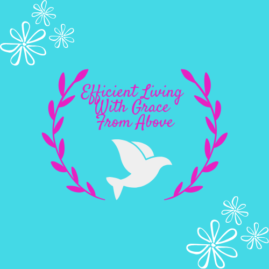Have you had days you wake up and not know what to do, and just idle away your time figuring out what to do next; when in reality you have a mountain load of things to do? Well, that has happened to me several times, until I learned to establish a routine.
Establishing routines will help your day to be well ordered, as there will be a certain predictability for the day. If you don’t have a routine, things can get quite chaotic and out of hand. While I was doing my Residency, I didn’t really have a routine, as I would be away for long and rather random periods of time. So whatever time I did have back at home, I didn’t have much of a structure. I just did whatever came along. When I started being a stay- at-home mom, I learned to establish a routine after the first several months, and things have become much smoother, hence. The routine has helped me keep a balance with spiritual life, managing housework, family and homeschooling, to a great degree.
Like we have a general routine, we also have a homeschool routine. So kids know exactly what is expected of the day, and they don’t need me to tell them to go ahead and start school. It comes very naturally, as it is similar to developing a habit. You just go ahead and do it, without even thinking about it.
Once in a while, I like to do random things, and it is good to be spontaneous at times. I sometimes give the kids a ‘break day’ so that I can clean out the homeschool room closet or catch up on something important. What I noticed is that if I do it too often, or let the kids just play the whole day without any structure, it tends to be pretty chaotic! If I provide atleast some loose structure to the day, it is much more manageable!

When there is no structure to the day, one tends to get lost not knowing what to do, or what to expect, trying to fill in time with random things, and not necessarily catering to the essentials.
Routines are things you do consistently every day (it may be different on different days of the week, to accommodate different activities on different days). Establishing a routine can take patience as well as trial-and-error. I don’t follow a rigid schedule, but rather establish routine using blocks of time. Using blocks of time is based on time frames to get things done rather than exact timings, as in a schedule. This allows for greater flexibility to achieve the task.
When you establish a routine, you are pretty much under the reassurance that certain tasks will be done in that day. There is a certain predictability that comes into play, as you know you will be getting to certain things throughout the day. When there is predictability, there is a smoother flow to the day, and more peace and calm. It keeps the flow of the day going. It can also boost productivity.
When things change from routine, there is confusion, and I usually find myself getting behind in housework.
What I include in my daily routine is all the very necessary things I need to do daily to keep up with what’s important to me- a simple, balanced, organized and healthy lifestyle. My weekday routine will include essentials, such as daily prayer, hygiene, cooking, laundry, dishes, homeschooling, general cleanup, reading and whatever extracurricular activities that happen on a regular basis. It forms a basic framework or structure for the day, upon which other(non-essential) things are added.
I still have gaps of time throughout the day, after all my routine essential tasks. I like flexibility, so I try to preserve such gaps of time, to a degree. This way, I can let life happen, accommodate minor emergencies, keep the house open for guests, do stuff on my ‘non-essential’ list, or just relax and have a bonus quiet time.If there is an emergency that lasts a few days, I cater to that first and then I come up with a different routine with a ‘barely surviving mode’ until the issue is solved. Regardless, it is always good to have a routine.
Following a routine does not mean that you have to shut life off other than the routine tasks. It just serves as the skeleton onto which all the other good stuff(such as nerves, blood vessels and muscles, yikes!) are added to ensure that the essentials are met every day. If you keep enough margin by preserving some gaps of time, you should be able to have a good level of flexibility. Following a routine by allowing flexibility will take you a long way.
If you don’t already have a routine, I encourage you to start thinking about all the ‘essential’ things you want to do daily for a balanced life. If you already have a routine, analyze whether there is some task that you are getting behind in, that you want to bring to a daily mode; or whether you have lots of extra gaps of time daily, that you can use to add in another habit, or take up another commitment. But remember to keep some gaps of time blocked out, to maintain margin and flexibility!
You can read about how to establish a routine in the post here

Great input Annilyn..thank you for this initiative
Thank you Betty!